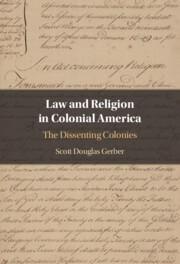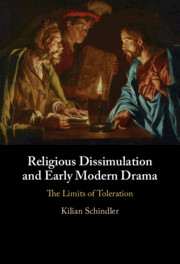55 results
8 - Reformations in the Low Countries
-
-
- Book:
- Reformations Compared
- Published online:
- 14 March 2024
- Print publication:
- 21 March 2024, pp 167-189
-
- Chapter
- Export citation
13 - Rousseau’s Dilemma, or “Of Civil Religion”
-
-
- Book:
- The Cambridge Companion to Rousseau's <i>Social Contract</i>
- Published online:
- 28 March 2024
- Print publication:
- 22 February 2024, pp 273-292
-
- Chapter
- Export citation
Moses Mendelssohn and the Jewish Questions of Modern Natural Law
-
- Journal:
- Journal of Law and Religion / Volume 39 / Issue 1 / January 2024
- Published online by Cambridge University Press:
- 29 April 2024, pp. 16-33
- Print publication:
- January 2024
-
- Article
-
- You have access
- Open access
- HTML
- Export citation
2 - John Milton and Expressive Conscience
-
- Book:
- The Coerced Conscience
- Published online:
- 07 December 2023
- Print publication:
- 21 December 2023, pp 22-40
-
- Chapter
- Export citation
1 - A New Kind of Politics?
-
- Book:
- The Coerced Conscience
- Published online:
- 07 December 2023
- Print publication:
- 21 December 2023, pp 1-21
-
- Chapter
- Export citation
Conclusion - Law, Religion, and Historiography in Colonial America
-
- Book:
- Law and Religion in Colonial America
- Published online:
- 19 October 2023
- Print publication:
- 02 November 2023, pp 267-289
-
- Chapter
- Export citation
3 - Law and the Holy Experiment in Colonial Pennsylvania
-
- Book:
- Law and Religion in Colonial America
- Published online:
- 19 October 2023
- Print publication:
- 02 November 2023, pp 67-133
-
- Chapter
- Export citation
Introduction - English Law about Religious Toleration Prior to the Planting of Colonial America
-
- Book:
- Law and Religion in Colonial America
- Published online:
- 19 October 2023
- Print publication:
- 02 November 2023, pp 1-15
-
- Chapter
- Export citation
5 - Law and a City Upon a Hill in Colonial Massachusetts
-
- Book:
- Law and Religion in Colonial America
- Published online:
- 19 October 2023
- Print publication:
- 02 November 2023, pp 179-266
-
- Chapter
- Export citation
2 - Law and the Lively Experiment in Colonial Rhode Island
-
- Book:
- Law and Religion in Colonial America
- Published online:
- 19 October 2023
- Print publication:
- 02 November 2023, pp 40-66
-
- Chapter
- Export citation
1 - Law and Catholicism in Colonial Maryland
-
- Book:
- Law and Religion in Colonial America
- Published online:
- 19 October 2023
- Print publication:
- 02 November 2023, pp 16-39
-
- Chapter
- Export citation
4 - Law and Congregationalism in Colonial Connecticut
-
- Book:
- Law and Religion in Colonial America
- Published online:
- 19 October 2023
- Print publication:
- 02 November 2023, pp 134-178
-
- Chapter
- Export citation

Law and Religion in Colonial America
- The Dissenting Colonies
-
- Published online:
- 19 October 2023
- Print publication:
- 02 November 2023
Conclusion
-
- Book:
- Religious Dissimulation and Early Modern Drama
- Published online:
- 31 August 2023
- Print publication:
- 28 September 2023, pp 226-237
-
- Chapter
-
- You have access
- Open access
- HTML
- Export citation
Chapter 1 - Religious Dissimulation and Toleration in Early Modern England
-
- Book:
- Religious Dissimulation and Early Modern Drama
- Published online:
- 31 August 2023
- Print publication:
- 28 September 2023, pp 27-47
-
- Chapter
-
- You have access
- Open access
- HTML
- Export citation
Introduction
-
- Book:
- Religious Dissimulation and Early Modern Drama
- Published online:
- 31 August 2023
- Print publication:
- 28 September 2023, pp 1-26
-
- Chapter
-
- You have access
- Open access
- HTML
- Export citation

Religious Dissimulation and Early Modern Drama
- The Limits of Toleration
-
- Published online:
- 31 August 2023
- Print publication:
- 28 September 2023
-
- Book
-
- You have access
- Open access
- Export citation
The antipaternalist psychology of William James
-
- Journal:
- Behavioural Public Policy , First View
- Published online by Cambridge University Press:
- 07 August 2023, pp. 1-26
-
- Article
-
- You have access
- Open access
- HTML
- Export citation
21 - Children’s Rights and Democratic Education
- from Part Three - Key Topics and Concepts
-
-
- Book:
- The Cambridge Handbook of Democratic Education
- Published online:
- 20 April 2023
- Print publication:
- 27 April 2023, pp 346-360
-
- Chapter
- Export citation
14 - Democratic Deliberation in the Absence of Integration
- from Part Two - Philosophical and Normative Foundations
-
-
- Book:
- The Cambridge Handbook of Democratic Education
- Published online:
- 20 April 2023
- Print publication:
- 27 April 2023, pp 230-249
-
- Chapter
- Export citation



